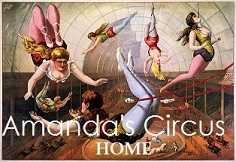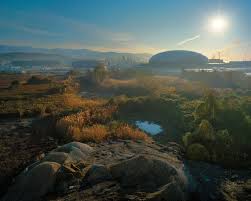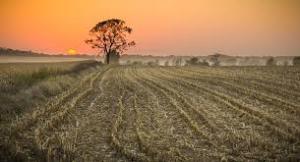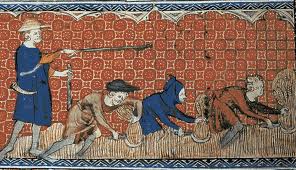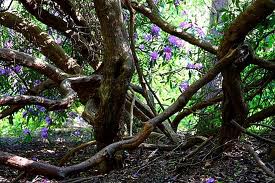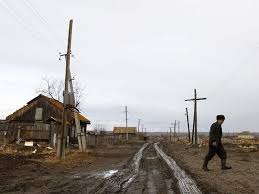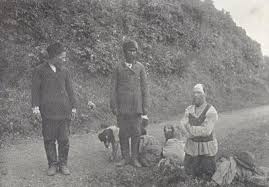The Future Remembered – ‘Harvest’ by Jim Crace and ‘The Slynx’ by Tatyana Tolstaya
While I was reading Harvest I felt The Slynx creep under my skin. Odd sensation and it started me thinking. Both are brilliant, imaginative books by two great writers. They’re stories that I couldn’t put down, books that caused me to ruminate on life’s big questions, rich in language, beauty and surprises. And when I’d finished reading, I missed the characters and their worlds, and I was glad, thankful that I’d read them. Each book felt like a gift from the author, and they resonate, I won’t forget them.

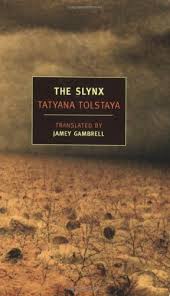 Harvest is set in the reimagined past, and yet it is about the future and present. The Slynx is set in a dystopian future and is about the past and present. Both stories are told by ‘serfs’ who don’t quite belong in their communities.
Harvest is set in the reimagined past, and yet it is about the future and present. The Slynx is set in a dystopian future and is about the past and present. Both stories are told by ‘serfs’ who don’t quite belong in their communities.
In a hamlet in pre-industrial England, over the course of a week, Walter Thirsk sees life change forever as England’s fields are irrevocably enclosed. This sense of eternity that Walter Thirsk feels about landscape is dangerously enticing.
From the lane, looking down towards the tracery of willows on the brook, the top end of our barley meadow, bristling and shivering on the breeze, showed us at last its ochres and its cadmiums, its ambers and its chromes.
This village community works together like a machine, with each person inevitably relying on the other. They cannot but believe that it will continue forever just as the land and seasons on which the rhythm of their life is based have always existed.
If, perhaps, we hear a barking deer nagging to be trapped and stewed or a woodcock begging to make his hearse in a pie, we lift our heads as one and look towards the woods as one and stare at the sun, reprovingly, if it’s been darkened by a cloud; our scythes and hand tools clack and chat in unison.
It connects to something deep inside me, memories of grabbling around in the dark rooms of rhododendron bushes when I was a little girl, digging the black leafy soil under the hedge with my fingers to bury a tin box, knowing every branch and knobble of the apple tree I climbed. And now on my regular walks, I know every tree and bush and lump and bump of my route and when builders cut down an old oak tree by mistake I was livid, bouncing mad with nowhere to go. Of course this is the point. Landscape, the sea, the forests, the stars, political systems, the NHS, schools, life, it doesn’t stay the same. Nothing does. We can perhaps slow down the wrong kind of change. We can try to make right decisions, avoid mistakes. We can take advice from experts and consult the environmentalists, if it isn’t to late, but life will inevitably change.
In many respects, The Slynx could not be more different. Tolstaya has created a dystopian world set in a Moscow of the future, two hundred years after a nuclear explosion has sent communities back to pre-Neolithic times. It is blackly funny, scary, cynical and (she is Russian after all) highly symbolic.
But hello, the life of the main character, Benedikt, is not so very different from that of Walter Thirsk in Harvest or from many of us caught up in the mortgage-driven grind for that matter. Benedikt tells us:
You’re born, you die, you get up, you lie down, you dance at your neighbor’s wedding, or in the morning in the stern raspberry dawn you wake in fright as though somebody hit you with a stick, like you alone remain alive on earth- and the stars are still there, always still there, pale, indistinct, eternal, silent.
I can’t count the number of times I’ve gone for a walk amongst trees or down to the sea or just gone out at night to watch the stars in order to put my problems in perspective. But I’m lucky, the stars in my part of the world still shine brightly, for now.
Walter Thirsk is an intelligent, literate man whose existence is controlled by the lord of the manor and ruled by the seasons, he alone has ventured beyond the village. Benedikt is without original thought and lives in an unruly dictatorship where books are banned. Freethinking and the mythic Slynx wait in the frightening wilderness beyond the village.
In the summer the Scribe is like an ordinary Golubchik – a sickle on his shoulder and into the fields and glades to cut goosefoot, horsetail. Bring in the sheaves. You tie them up – lug them to the shed, and go back again, another time, once more, all over, run, run, run. While he’s gone the neighbors or a stranger will filch a couple of sheaves for sure, sometimes from the field, sometimes straight from the shed. But that’s all right: they steal from me, and I’ll get good and mad and steal from them, those guys will steal from these guys – and so it goes in a circle. It comes out fair. Everyone steals, but everyone ends up with their own. More or less.
Benedikt is a humble scribe whose life is spent hand copying the words of the tyrannical leader Fyodor Kuzmich. These ‘words’ are actually taken from great works of Russian literature thereby making Fyodor Kuzmich his world’s only writer. Benedikt sees books as objects but is unable to take any meaning from them. He lives in a brutal society of ‘oldeners’ – people who have survived ‘the blast’ and will live forever, and people born with genetic mutations ‘consequences’. Mice are their only source of food, clothing and barter. When Benedikt proposes to Olenka, the beautiful daughter of Fyodor Kuzmich, he discovers that Kuzmich has a room full of books and his life is changed forever.
Tolstaya started this book in the 1980s during the soviet regime and finished it under Putin. Both Harvest and The Slynx make one wonder about individualism, socialism and freedom, about accepting one’s place in the world or not. And because of this and because of the startlingly gorgeous writing, both of these books rank in my personal league of top ten best books I’ve ever read. Harvest has left me with an image of a tough yet bright and golden world and a sense of forthcoming apocalypse. The Slynx has left me with an image of misery, gloom and mud and the possibility of hope. It feels good to read books that take you beyond your own small existence. Thank you Jim Crace and Tatyana Tolstaya.
